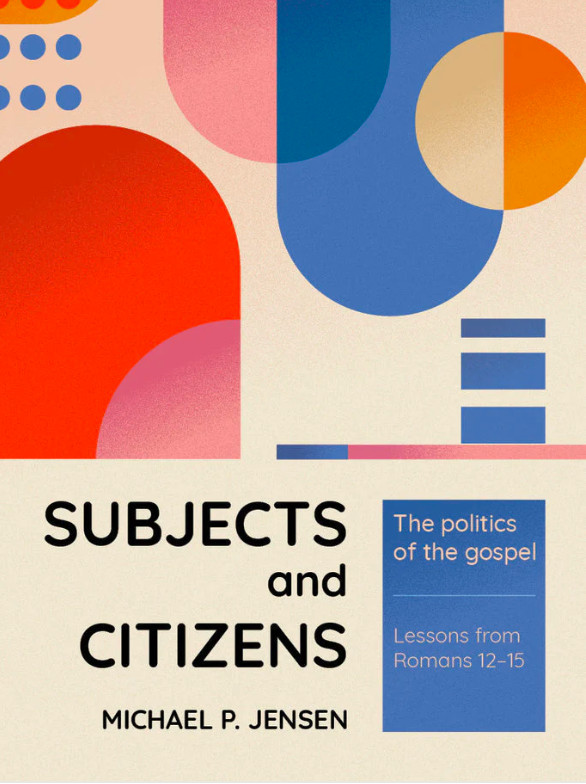Book Review by Stephen Driscoll of Subjects and Citizens The Politics of the Gospel: Lessons from Romans 12–15 by Michael Jensen.
Michael Jensen‘s new book surprised me, because I was expecting a different kind of book. I expected a book that would walk me through the hot issues of the day and tell me what to think. This book doesn’t do that. It didn’t tell me what to think, but it challenged what I think about.
It’s obvious that people are divided by politics in 2024. The Western world is polarised, and angry, and angry about the polarisation, and polarised about the cause of the polarisation, which makes us angry. Almost any topic, from the Ukraine war to pronoun policy, is subject to a culture war, and therefore your opinion on any topic might draw you into the great clash between left and right, progressive and conservative.
You might be thinking, which side is this book on? Is it a left-wing book, is it a right-wing book, and you might already know whether you love it or hate based on which ‘side’ it’s on.
It’s not on a side. The book argues that Christianity is political. Christians believe that Jesus is Lord, and that’s a claim about the political order of the cosmos. As such, “Our act of gathering together under the lordship of Jesus Christ, in our (mostly) small local churches, is the most powerful piece of politics we can do” (P192). Evangelism is political, in fact “The best and most authentic strategy for Christianizing a society is not primarily legislative. It is evangelistic.” (P192).
Jensen distinguishes Politics 1.0 from Politics 2.0. Politics 1.0 is the politics of the world, the politics we talk about and read about. Politics 2.0 is the great political work of Jesus Christ in establishing and maintaining his rule over the world. It’s the political program of the kingdom of God. It supervenes our squabbles about capital gains tax or public school spending, though it doesn’t erase their importance.
Unfortunately, “the captivity of Christianity to worldly politics (Politics 1.0) as a means of protecting or advancing the faith is not simply a strategic disaster. It is a spiritual disaster… When that has been the case, Christians have shown a deeper faith in the patterns of the world than they have in the sovereignty of God and the lordship of Christ. It is not too much to say that this is a form of idolatry.” (P191).
So, what is Christian politics all about? Perhaps the key word that came to mind as I read Michael’s book was distinctiveness. Hence, “A true Christian politics is not, then, in the first place about being more political: it is about being more Christian.” (p189). And the route to this distinctiveness is grace and transformation, “The most effective political thing that Christians can do is to open ourselves to being transformed by the grace of God as we renew our minds. We need to be people who are metamorphosed into the image of Jesus Christ. By living lives that show that Jesus Christ is Lord, we will be engaging in the most powerful political program ever devised, even though it might not look like it in the middle of history.” (p53).
Unfortunately, a lot of Christians take their eye off the ball and put their deepest hope in Politics 1.0. Jensen discusses the sort of eschatological (end times) hope that even Christians put in their governments (p95).
Instead of such hope, Jensen counsels pragmatism and realism. Michael unpacks Romans 12—15, and argues from it that Christians should be realists because government operates “in the sphere of hard-heartedness rather than in the sphere of the Spirit.” (p98).
The book then, focuses much more on the gospel, on Godliness and on Jesus, that I expected. It is illustrated by political history and theory, but its heartbeat is the Biblical story. That Biblical story has a lot to offer the world since, amongst other things, “What secular Western culture has difficulty admitting is that the idea of the equality of all human beings and the notion of human rights-meaning that we owe one another certain fundamental dignities and freedoms-are learned not from nature or reason but from Christianity.” (p162).
Occasionally, in search of better Politics 2.0, the book rebukes you: “So let me say this directly to you, because probably no-one dares say it to you face to face: If conflict follows you around and you think you are never at fault, then could you have it wrong? Conduct a fair inventory of your last conflict. Can you honestly say that you didn’t contribute to it? Do you have an ‘I might have got it wrong’ category?” (p75). Hence it ended up being more practical and personal than I expected.
There are a few slightly controversial claims (which is good!) like that Christians should have obeyed government mask and lockdown mandates (p110), that character and competence are more important than whether a candidate has faith (p97, relevant to a certain American presidential candidate), or that many different political forms are Biblical, but that anarchism is not (p99). I happen to agree with each of these claims.
I’d happily recommend this book to anyone interested in learning about a Christian perspective on politics. It’s very clear, well-written, and enjoyable.

Subjects and Citizens The Politics of the Gospel: Lessons from Romans 12–15 Michael Jensen, Matthias Media 2024. Available from The Wandering Bookseller $15.99

